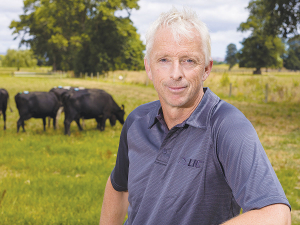Herd production performance soars
New data released by LIC and DairyNZ shows New Zealand dairy farmers have achieved the highest six week in-calf rate and lowest notin- calf rate on record.
 LIC chief scientist Richard Spelman says results from the first year of a research project into bull genetics could help farmers meet the challenge of being profitable and sustainable.
LIC chief scientist Richard Spelman says results from the first year of a research project into bull genetics could help farmers meet the challenge of being profitable and sustainable.
LIC says new research has confirmed that bull genetics play a role in how much methane they emit.
The artificial breeding company says this highlights the potential for farmers to breed low methane-emitting cows in the future.
The news comes at a important time for farmers who are awaiting the Government’s decision at the end of the year on which emissions pricing scheme they will be subject to: The controversial New Zealand Emissions Trading Scheme (ETS) or He Waka Eke Noa (HWEN).
The research, funded by the New Zealand Greenhouse Gas Research Centre (NZAGRC) and run by LIC and CRV, measures methane emissions from the burps of young bulls set to father the next generation of New Zealand’s dairy cows.
Results from year one, where the feed intake and methane emissions from 281 bulls were measured, found there is genetic variation in the amount of methane emitted after accounting for the feed eaten by the bulls, with the lowest bulls emitting approximately 15-20% less methane than the average.
LIC chief scientist Richard Spelman says the results mark a big step forward for the research.
“The amount of methane a bull or cow produces directly relates to the amount of food it eats - generally speaking the more an animal eats, the more methane it will emit,” he says.
Spelman says that after accounting for differences in the bulls’ feed intake, researchers are still seeing genetic variations in their methane emissions which, he says, proves that genetics play a role in emissions.
“We have a sliding scale from bulls that are low-methane emitters (less than 18g of methane/kg of dry matter eaten) to bulls that are on the higher end (more than 28g of methane/kg of dry matter eaten). This is the variation we were wanting to see and we’re excited to use it to our advantage.”
Although the research is still in the early stages, Spelman says the results show promise.
“This methane research is a long-term project but it has the potential to make a real difference to farmers in the future by providing another tool to reduce their farm emissions.
“New Zealand farmers are striving to meet the challenge of being profitable and sustainable, and research like this will help ensure reducing a farm’s emissions doesn’t have to come at the cost of reducing its milk production,” Spelman says.
He says the next step is to see if the genetic variation responsible for methane emissions in growing young bulls is replicated in their daughters.
“This year, in partnership with Pāmu, we will breed from bulls that we’ve identified to be high or low methane emitters. After their daughters are born, we’ll measure their emissions as growing yearlings and during their first milking season to ensure they’re representative of their fathers. This is where the rubber will really hit the road in our aim to offer farmers a low-methane breeding solution.”
The second year of the research is now underway with methane emissions being measured from approximately 300 young bulls from LIC and CRV’s 2022 Sire Proving Scheme.
Ministry for Primary Industries (MPI) director general Ray Smith says job cuts announced this morning will not impact the way the Ministry is organised or merge business units.
Scales Corporation is acquiring a number of orchard assets from Bostock Group.
Family and solidarity shone through at the 75 years of Ferdon sale in Otorohanga last month.
The Ministry for Primary Industries (MPI) has informed staff it will cut 391 jobs following a consultation period.
New Zealand farmers are committed to making their businesses more resilient to climate change and are embracing innovation to help them do so.
Atiamuri farmers Paul and Lesley Grey never gave up their dream of owning their own farm – and in 2020, that dream came true.
OPINION: Scientists claim to have found a new way to make a substitute for cow's milk that could have a…
OPINION: The Irish have come up with a novel way to measure cow belching, which is said to account for…